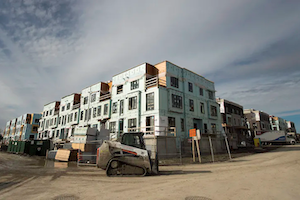Toronto approves plans to build more rental homes and support community housing
Toronto’s city council has approved a series of recommendations from staff to deliver more rental housing in town, and improve housing stability for renters.

The program replaces the City’s Open Door Affordable Rental Housing Program, and would support the city in achieving its goal of creating 65,000 rent-controlled homes including 6,500 rent-geared-to-income (RGI) homes by 2030.
The program proposes several actions, including allocating as much as $351 million in capital funding to 18 affordable rental housing projects, enabling construction to start in 2024 and 2025. The city expects that funding will help almost 6,000 new rental homes including 2,600 affordable rental and 3,380 rent-controlled homes stuck in pre-development phases move forward with construction.
It would also pilot a Community Housing Pre-development Fund to support non-profit, co-op and Indigenous housing providers to advance new projects, and establish a framework to allocate up to $260,000 per unit in capital funding for new RGI and affordable rental homes.
Council also approved the proposed Community Housing Sector Modernization and Growth Strategy, which would strengthen the sector by enabling organizations such as Toronto Community Housing Corporation and Toronto Seniors Housing Corporation to acquire more homes that can be converted to affordable homes permanently; and to grow their housing stock to respond to the growing need for RGI and affordable rental homes.
As part of that plan, City Council also endorsed several updates to the Multi-Unit Residential Acquisition (MURA) program, which provides funding and incentives to support the acquisition of private market rental housing by non-profit housing providers, Indigenous housing providers, co-operatives and community land trusts.
Finally, the city approved a plan to protect tenants against renovictions – the process by which a landlord illegitimately evicts a tenant by alleging that vacant possession of a rental unit is needed to make renovations or repairs.
A proposed renovictions bylaw would require landlords to apply for a renovation licence before starting renovations; submit a report showing a need for vacant possession of the unit to do the renovations; and provide compensation or an accommodation plan for tenants, where applicable.
“Today we took big steps towards transforming our housing system to benefit the people of Toronto,” said Mayor Olivia Chow. “We’re launching a program to start a non-profit and co-op housing boom. We’re expanding MURA to help purchase more affordable homes and keep them affordable forever. We’re moving forward on new policies to protect renters from renoviction. All these changes will help build more affordable homes and protect renters.”








